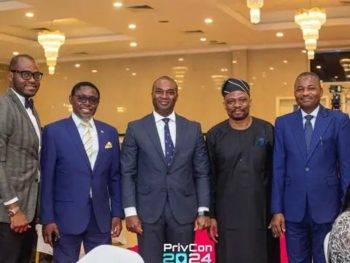The Nigerian government has forged a historic alliance with all 36 states and the private sector to uplift the nation into a $1 trillion economy by 2030. The ambitious initiative, formalized through the Aso Accord on Economic and Financial Inclusion, represents a cornerstone of President Bola Tinubu’s Renewed Hope Agenda.
This unprecedented agreement symbolizes a shared commitment to ensuring equal access to financial services for all Nigerians, regardless of their circumstances. By democratizing finance and empowering entrepreneurs from the grassroots level, the accord aims to catalyze sustainable economic growth and address the intertwined challenges of poverty and insecurity through widespread prosperity.
Financial Inclusion as a Moral Imperative
Unveiled at a two-day National Stakeholders’ Workshop on Economic and Financial Inclusion, the Aso Accord underscores the Nigerian government’s recognition of financial inclusion as not merely an economic goal but a moral duty. As Dr Nurudeen Zauro, the President’s Technical Advisor on Financial Inclusion, eloquently stated, “Financial inclusion is not only a vital economic goal but also a moral duty to open up possibilities for all Nigerians to realize their full potential.”
The agreement outlines a robust framework to democratize access to finance, empower entrepreneurs, and foster economic transformation from the bottom up. By enabling every Nigerian, regardless of their circumstances, to access credit, save, invest, and insure their lives and businesses, the accord seeks to fuel an entrepreneurial revolution that drives economic transformation across the country.
A Collaborative Effort for Transformative Change
The Aso Accord was signed by Vice President Kashim Shettima, Minister of Finance and Coordinating Minister of the Economy Mr. Yemi Cardoso, and National Security Adviser (NSA) Mallam Nuhu Ribadu, representing the federal government. Notably, the Chairman of the Nigeria Governors Forum, Governor AbdulRahman AbdulRazaq, signed on behalf of the 36 states, while the private sector was represented by Mr. Abubakar Suleiman, Managing Director/Chief Executive Officer of Sterling Bank Plc.
Among the key aspects of the agreement are the formation of a top-tier Presidential Council to spearhead reforms, potentially through an Executive Order, and a focus on innovative approaches such as government-to-person (G2P) initiatives to channel investments directly into underserved communities. . AHe emphasized, “The Aso Accord reflects the president’s determination to leave no Nigerian behind on our journey to sustainable prosperity.
Nigerian Government’s Impressive Policies Face Implementation Hurdles
The Nigerian government has a track record of formulating impressive policies aimed at improving the lives of its citizens, particularly those from underprivileged backgrounds. However, the real challenge often lies in the effective implementation of these well-intentioned policies. Despite the Nigerian government’s efforts, the lack of proper execution has hindered the intended impact on the lives of the less privileged in Nigeria.
Ensuring that policies are executed efficiently is crucial to truly enhancing the lives of those in need. The gap between policy formulation and implementation has been a persistent issue, leaving many well-designed initiatives falling short of their intended goals. Bridging this gap through strong governance, accountability measures, and robust monitoring mechanisms is essential to unlock the true potential of these policies.
Aso Accord: A Step Towards Financial Inclusion and Prosperity
In a move towards financial inclusion and economic empowerment, President Bola Tinubu’s administration has introduced the Aso Accord. This agreement underscores the Nigerian government’s commitment to ensuring that every Nigerian has access to financial services, thereby breaking the cycle of poverty and enabling full participation in the country’s economy.
The Aso Accord is a key component of the Renewed Hope Agenda, a comprehensive strategy aimed at transforming Nigeria into a $1 trillion economy by 2030. By addressing issues of poverty and insecurity through widespread prosperity, the Nigerian government aims to create an environment conducive to economic growth and social development.
Access to financial services is widely recognized as a critical factor in promoting economic inclusion and empowering individuals to take control of their financial well-being. The Aso Accord represents a significant step towards achieving this goal, as it seeks to remove barriers and create opportunities for all Nigerians, regardless of their socioeconomic status or location.
Table of Contents
Discover more from OGM News NG
Subscribe to get the latest posts sent to your email.














